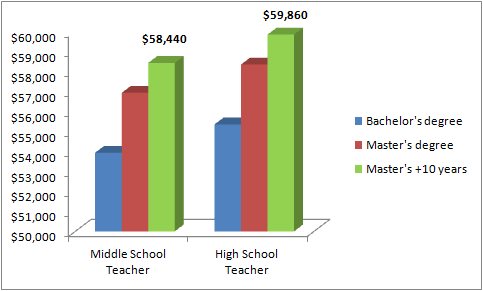To become a high school history teacher, you need to earn a bachelor’s degree in education or history, complete a teacher preparation program, and obtain state certification. Additionally, gaining classroom experience through student teaching or internships can also be valuable.
Becoming a high school history teacher involves several important steps. To start, you’ll need to earn a bachelor’s degree in education or history. After completing your degree, you’ll then need to enroll in a teacher preparation program and fulfill any additional requirements set by your state.
Gaining classroom experience through student teaching or internships can also be beneficial in preparing you for a career as a high school history teacher. Keep in mind that obtaining state certification will be necessary to secure a teaching position.
Education Requirements
To become a high school history teacher, you need a bachelor’s degree in education or history. Completing a teaching certification program and gaining classroom experience is essential for this career path. Additionally, obtaining a teaching license is required to teach in public schools.
Bachelor’s Degree in History or Related Field
One of the essential education requirements to become a high school history teacher is earning a bachelor’s degree in history or a related field. A bachelor’s degree provides you with a solid foundation in history and allows you to deepen your knowledge in various historical periods, events, and themes. It also helps you develop critical thinking, research, and analytical skills, which are essential for effectively teaching history in a high school setting.
During your undergraduate studies, you can expect to take courses that cover a wide range of historical topics. These courses may include American history, European history, world history, ancient civilizations, and more. Additionally, you may have the opportunity to choose specialized courses in areas such as art history, political history, cultural history, or military history, depending on your interests.
Teacher Certification Program
In addition to a bachelor’s degree in history or a related field, aspiring high school history teachers need to complete a teacher certification program. Teacher certification programs provide individuals with the necessary skills and knowledge to be effective educators in the classroom.
These programs typically include coursework in educational psychology, teaching methods, lesson planning, classroom management, and assessment. You will also gain hands-on experience through student teaching or supervised internships, where you will have the opportunity to apply what you have learned in a real classroom setting.
It is important to note that the specific requirements for teacher certification vary by state, so it is essential to research and understand the requirements in the state where you plan to teach. Some states may require additional exams or assessments to obtain certification.

Credit: www.teacher.org
Gain Teaching Experience
To become a high school history teacher, gaining teaching experience is crucial.
Student Teaching
Participate in supervised student teaching to develop practical skills in the classroom.
Substitute Teaching
Gain substitute teaching experience to work in different classroom settings and with diverse student populations.
Also Read: How to Become Welder
Acquire Advanced Education
To become a high school history teacher, obtaining advanced education is crucial.
Master’s Degree in Education or History
Earning a Master’s in Education or History enhances teaching skills.
Professional Development Courses
Engaging in professional development courses aids in career growth.

Credit: www.teachersoftomorrow.org
See Also: How to Become a Realtor in Indiana
Specialize in History Education
Becoming a high school history teacher requires a deep understanding of historical events, cultures, and significant figures. It’s crucial to specialize in history education to gain the necessary knowledge and skills to effectively teach this subject to students.
Advanced History Courses
One way to specialize in history education is by taking advanced history courses. These courses delve into specific historical periods or regions, allowing you to develop a comprehensive understanding of the subject matter.
Some advanced history courses you can consider include:
- Ancient Civilizations: Learn about the ancient civilizations that shaped the world we live in today.
- World Wars: Explore the causes, events, and aftermath of the two world wars.
- American History: Study the rich history of the United States, from its founding to present day.
By taking these advanced courses, you’ll not only expand your knowledge but also gain insights that you can share with your future students, making your history lessons more engaging and informative.
Participate in History Workshops or Seminars
To enhance your expertise in history education, it’s essential to participate in history workshops or seminars. These events offer opportunities to connect with other educators and learn new teaching strategies and techniques.
Here are a few benefits of attending history workshops or seminars:
- Networking: Connect with other history teachers and professionals in the field, fostering professional relationships and sharing valuable resources.
- Professional Development: Stay up-to-date with the latest teaching methods and technologies, ensuring you provide the best possible education to your students.
- Learn from Experts: Acquire insights from experienced history educators who can offer practical tips and share their successful classroom practices.
Remember, continuing your education through workshops and seminars is an ongoing process. By participating in these events regularly, you’ll continuously refine your teaching skills and stay current in your field.
Develop Classroom Management Skills
Developing strong classroom management skills is essential for anyone aspiring to become a high school history teacher. Effective classroom management fosters a positive learning environment, minimizes disruptions, and maximizes student engagement. It also establishes a respectful and orderly atmosphere in which students can thrive academically and socially.
Effective Discipline Strategies
When implementing discipline strategies, it’s important to be consistent and fair. Establish clear expectations and consequences at the beginning of the school year. Be firm but respectful when addressing misbehavior, and aim to resolve issues privately whenever possible. Building relationships with students can also enhance discipline, as it fosters respect and trust within the classroom. Providing positive reinforcement for good behavior can also promote a harmonious learning environment.
Engaging Lesson Planning
Creating engaging lesson plans is crucial for captivating students’ interest and fostering a passion for history. Incorporate various teaching methods, such as multimedia presentations, group discussions, and interactive activities. Utilize relevant and compelling historical content to make lessons engaging and meaningful. Incorporate real-world connections to demonstrate the relevance of historical events to students’ lives today.
Stay Informed about Education Trends
Becoming a high school history teacher requires dedication to staying informed about education trends. Keeping up to date with the latest advancements in teaching methods, curriculum strategies, and educational research will enhance your ability to offer the best possible learning experience for your students.
Attend Educational Conferences
Attending educational conferences is a vital way to stay informed about the latest trends in education. Conferences offer opportunities to engage with other educators, participate in workshops, and gain insights from renowned experts in the field. Sharing knowledge and experiences with peers can foster a collaborative environment that enriches your teaching practice.
Network with Fellow Educators
Building a network of fellow educators is essential for staying informed about education trends. Engaging in discussions, joining professional associations, and connecting with like-minded individuals can provide valuable perspectives and resources. Collaborating with other educators allows you to exchange innovative ideas and best practices, ultimately enhancing your teaching approach.
Prepare for Licensure Exams
One of the crucial steps towards becoming a high school history teacher is to prepare for the licensure exams. These exams are designed to assess your knowledge and understanding of key concepts in history and teaching methodologies. By successfully passing these exams, you demonstrate your competency and qualify for a teaching license. Let’s explore the two important aspects of preparing for licensure exams: studying for the Praxis exam and fulfilling state-specific licensure requirements.
Study for Praxis Exam
The Praxis exam is a standardized test that measures your subject-specific knowledge and teaching skills. To ace this exam, it is essential to create a focused study plan. Here are a few tips to help you prepare effectively:
- Start by familiarizing yourself with the exam format and content. Understand the types of questions that you will encounter, such as multiple-choice, essay, or scenario-based questions.
- Identify your strengths and weaknesses in different historical periods and teaching methods. Spend more time on areas where you struggle and allocate sufficient time for practice.
- Utilize study resources such as textbooks, online courses, practice tests, and study guides. These resources can provide valuable insights and help you gauge your preparedness.
- Create a study schedule and allocate dedicated time each day for revision and practice. Consistency is key when it comes to studying for the Praxis exam.
- Form study groups or join online forums where you can discuss historical topics and teaching strategies with fellow aspiring teachers. Engaging in discussions can deepen your understanding and broaden your perspective.
Fulfill State-specific Licensure Requirements
In addition to the Praxis exam, each state has specific licensure requirements that you must fulfill to become a certified high school history teacher. These requirements may vary, but commonly include:
| State-Specific Licensure Requirements |
|---|
| Completion of a Bachelor’s degree in history or education |
| Completion of a state-approved teacher preparation program |
| Passing a background check |
| Submitting official transcripts from your education institution |
| Passing a teaching performance assessment |
| Completing supervised teaching experience or student teaching |
To ensure a smooth licensure process, carefully review your state’s requirements and ensure you fulfill all the necessary criteria. It is also recommended to seek guidance from your academic advisor or the state education department for any specific requirements or updates.
By focusing on studying for the Praxis exam and fulfilling state-specific licensure requirements, you are taking significant steps towards becoming a high school history teacher. Stay committed to your studies, stay informed about the requirements, and you’ll be well on your way to achieving your teaching goals.
Seek Employment Opportunities
Apply for Teaching Positions
Check online job boards and school district websites for open history teacher positions.
Consider Substitute Teaching or Tutoring
Gain experience and make connections in the education field by taking on substitute teaching or tutoring roles.

Credit: resilienteducator.com
Conclusion
In a nutshell, becoming a high school history teacher requires a combination of passion for the subject, dedication to education, and a commitment to shaping young minds. By acquiring the necessary qualifications and experience, developing effective teaching strategies, and staying up-to-date with the latest educational trends, you can embark on a rewarding career in educating future generations about the past.
So, if you have a love for history and a desire to inspire, don’t hesitate to pursue your dreams of becoming a high school history teacher.
